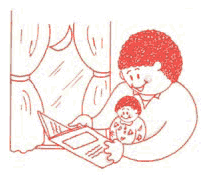The activities in this section are designed to help you prepare your child to learn and develop. Most of the activities are simple and easily can be made part of your daily routines. As you do the activities, remember that repetition is important, especially for very young children. Children enjoy and learn from doing the same activity over and over.

The activities are organized by the following age groups:
Babies = Birth to 1 year old
Toddlers = 1 to 3 years old
Preschoolers = ages 3 to 5
Keep in mind that children don't always learn the same things at the same rate. And they don't suddenly stop doing one thing and start doing
another just because they are a little older. So use the ages as guides as your child learns and grows and not as hard and fast rules. For example, an activity listed for the toddler age group may work well with a baby. On the other hand, the activity may not interest another child until he becomes a preschooler.
In addition, the activities change to meet the needs of children in the different age groups. Reading aloud activities are good examples. Reading aloud with your baby involves showing her a book and largely telling the story without placing too much emphasis on the actual written words. With older infants and toddlers, you stick closer to the written words and ask your child to identify or name pictures that go with the words. As your child develops language skills, you shift some of the story "reading" to her. When your child starts to recognize letters and perhaps words, you can call her attention to words that appear often or that she has learned to recognize from other reading.
When your child starts to recognize letters and perhaps words, you can call her attention to words that appear often or that she has learned to recognize from other reading. |
Each section begins with a list of accomplishments and behaviors that are typical for the children in the age group. This is followed by a list of things that you can provide to help your child learn and grow. Again, because each child learns at his own rate, you should consider the lists only as guidelines.
As you use the activities, please remember the following points:
- Some of these activities, although listed for a particular age group, are beneficial for children in all of the age groups. Reading aloud, for example, is important to children from the time they are born. By modifying an activity, you enable your child to continue to enjoy it as she grows and develops.
- Find activities that interest your child. If you pick an activity that is too hard, your child may get discouraged. If it's too easy, he may get bored. Or if your child seems uninterested in an activity, try it again at some other time. Often children's interests change as they grow. Try to give your toddler or preschooler a choice of activities so that he learns to think for himself.
- The activities are meant to be fun. As you and your child do an activity, be enthusiastic and avoid lecturing to her about what she is learning and how important it is. If your child enjoys the activity, her excitement for learning will increase.
Learning Activities for Children: